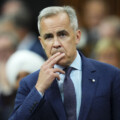If you have a gambling problem, watching a hockey game has become a stern test of your willpower.
Single-game sports gambling was legalized in 2021, and a deluge of commercials followed. Dr. David Hodgins, a University of Calgary psychologist and research coordinator at the Alberta Gambling Research Institute, says it’s too early to tell if the ads will lead to more people developing gambling problems. He suspects, however, they will “probably complicate the gambling problems of people who already have gambling problems.”
The challenge in fighting addiction is avoiding relapses. These tend to be stimulated by cues; if you’re trying to quit drinking, you avoid bars. “We know from interviewing people who have overcome gambling problems that they often do something to reduce their exposure to gambling,” Dr. Hodgins says. “Undoubtedly the dramatic increase in advertising is a factor affecting people who are struggling to not gamble.”
It’s still reasonable to advertise alcohol, but gambling commercials and their promise of free bets have become the equivalent of beer companies coming to your house and offering you a drink. The influx of prop bets, which allow you to wager on quick results ranging from which team scores first to whether a specific player accrues certain statistics, offer immediate results and a constant source of stimulation. This, Dr. Hodgins points out, is the easiest way to get hooked.
“That makes the experience more continuous, and we know that continuous types of gambling are more addictive. Slot machines are highly addictive because you can gamble many times a minute. Whereas very few people get into problems with lottery tickets because you have to wait a few days for the outcome. Sports betting is not the most addicting in its classic form, but there’s a concern that with the new ability to gamble more continuously that it’s more problematic.”
Online gambling in particular has a higher association with problem gambling, and American data shows it attracts (and hooks) 18 to 24-year-olds. You’re sitting on your couch, your phone is right there, it sure looks like Auston Matthews is destined to complete his hat trick, and ads keep tempting you with profit. Why not make it interesting?
The psychology of gambling commercials is, in some ways, obvious. There’s not much subtlety to a flashy ad where an attractive person promises you easy winnings. But sports gambling, Dr. Hodgins points out, preys on the assumption that we know more than we do.
“It’s the same phenomenon as poker. There’s a large chance element to it, but you can be a bit better than others. Humans have a natural tendency to see chance outcomes as outcomes we can influence. Even something clearly random, like throwing a pair of dice, people trying to get ones tend to throw the dice much lighter than if they’re looking for sixes, where they’re much more aggressive. With sports betting, knowledge is helpful but the outcomes are pretty random. People believe they’re skilled, but they’re too difficult to predict.”
In April Dom Luszczyszyn, a writer for The Athletic, documented the “incredible high” and “complete rock bottom” of his routine betting. If someone whose career is based on the statistical analysis of sports can suffer a mental health crisis thanks to gambling gone awry, amateurs should be wary about thinking they can consistently beat the house.
The ease of online gambling does, in theory, also make it easier to limit risks. Sites can allow you to ban yourself, and gamblers can pre-commit what they’re willing to lose, a technique Dr. Hodgins says has been effective when made mandatory in other jurisdictions.
“You’re separating the decision-making from the heat of the moment. We know that people will often chase their losses, which of course typically leads to further losses. Those decisions are prevented if someone has to pre-commit. But it’s most helpful if it’s mandatory as opposed to voluntary. The people who need it tend to be reluctant to use it.”
Proactivity helps. Dr. Hodgins contributed to a 2021 study in Norway where, like most Canadian provinces, gambling is a government monopoly. Some of the country’s biggest gamblers were sent a letter telling them how much they were spending, others were called, and others were ignored. While some could afford to eat their losses, those contacted by mail reduced their gambling a little, and those spoken to on the phone reduced their gambling a lot. Dr. Hodgins called it a “minimal customer service act” that led to no complaints.
“If you proactively contact people and provide them with support, we know that people appreciate that kind of intervention. You’d think people might be irritated and say their expenses are none of your business, but, generally, people like it because they feel like someone is taking care of them.”
But when provinces provide both a service designed to be addicting and the treatment for that addiction, a dilemma emerges.
“Provinces have generally provided some supportive features. There is a reluctance to make them mandatory. The assumption is that the public wouldn’t want it. The reality is that these responsible gambling features reduce expenditure, which then of course reduces gambling revenue because it’s people with gambling problems who gamble the most.”
Dr. Hodgins points out that all of this knowledge is there; it’s up to provinces to use it.
“The unfortunate part is that there are lessons that can be learned from other jurisdictions, we don’t have to learn everything ourselves. That was less true for cannabis, there weren’t a lot of details from other jurisdictions. With gambling, some jurisdictions stand out as doing a good job of protecting the public.”
The good news is that all of this advertising may eventually die down. Dr. Hodgins pointed to cannabis, where the advertising rules became sterner over time, and the fight for market share reached a conclusion. In the meantime, some provinces are educating the public on the risks of gambling, and the resources available to help addicts. And the irony of online gambling becoming ubiquitous is that it’s also easier to link people to support.
“We tend to just provide a link somewhere, often a little bit hidden. But we can do it more proactively when people are clearly gambling in a problematic way.”
Provinces have become both bookies and therapists, and now they need to decide which role they’ll take more seriously. So far, advertising budgets have superseded addiction services funding. But Canada may learn painful lessons that other countries have already processed about what happens when the government creates the very addicts it’s supposed to protect.
Recommended for You

‘Another round of trying to pull capital from Canada’: The Roundtable on Trump’s latest tariff salvo

‘We knew something was coming’: Joseph Steinberg on how Trump is ramping up his latest tariff threats against Canada

Rudyard Griffiths and Sean Speer: Canada’s high-stakes standoff with Trump

Falice Chin: The ‘wild and weird’ Calgary Stampede



